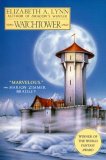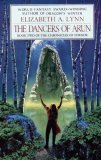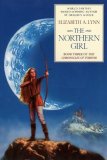
![]() Watchtower by Elizabeth A. Lynn
Watchtower by Elizabeth A. Lynn
Watchtower, the first book in the award-winning THE CHRONICLES OF TORNOR series by Elizabeth A. Lynn, follows the tale of a young prince — why is he called a prince when his father is a lord? I have no idea. This bothered me through the whole book — who has to fight against a usurper to regain his lands.
Watchtower is frequently included on lists of feminist and gay SFF. It does deal with an underlying homoerotic tension between the prince and his soldier, and the other two main characters are of ambiguous gender — saying more would spoil the unfolding of that plot. Compared to books today I doubt either of these issues would raise an eyebrow. After reading it, I surely didn’t consider this to be a shining example of feminist literature. We’ve come a long way, baby, right?
I had a problem with Elizabeth Lynn’s writing style. Frequently I had to flip back a page to follow the construction of a particularly unruly sentence. At other times, paragraphs consisted of a string of short, choppy sentences that felt like speed bumps to the flow of the story. And then, you have weird word choices, where a farmer would be described as looking at the characters silently. While speaking. Or “I’m Errel,” said Errel.
Errel’s the prince/lordling, by the way. He’s supposed to be all mystical and enigmatic because he can read a Tarot deck — which of course is given a fancy name in the book. All I have to say is, “There’s an app for that.” I found most of the characters flat and uninteresting. Stock motivations serve as real character building. There are hints that things would get better in this regard in the next book, but if you can’t make me care about a character in 225 pages, I’m not going to give you another book to try. (Someone needs to market a Care Bear Stare machine for authors that magically makes readers care about characters. It would make so. much. money.)
According to the cover, this book won a World Fantasy Award… I just checked the internets. It won according to them, too. This is an award that people like Ursula K. LeGuin, Guy Gavriel Kay, and China Miéville have won, so I guess I was just expecting something more earth-shattering than what I got, which is a fairly standard “prince loses his kingdom and has to go get it back” quest in a quasi-medieval setting. Watchtower was more innovative at the time of its writing, but honestly, I have no idea how this book beat Harpist in the Wind, the final book in THE RIDDLE-MASTER OF HED series by Patricia A. McKillip, which I consider to be far superior. There are other, more exciting medieval adventure novels that have since been published, so I don’t recommend Watchtower unless you’re interested in the history of fantasy as a genre or of feminism in fantasy novels.






I remember this book winning. I do think sexual politics played a part. Lizzie was openly out (although in San Francisco, not the riskiest place in the world) and almost everybody liked her. I was in the Harpist in the Wind camp myself, but I have to admit that Lizzie was always friendly and approachable at conventions and author events. In the pre-Internet era, that probably helped. McKillip was more reserved and didn’t do many events if I recall correctly.
Marion, do you think the author’s personality affects award results? That’s not what readers hope to hear, but it’s not surprising. McKillip is still reserved, even in the internet era.
I do think, though, that books that are more risky or unique (rather than just plain good) are more likely to win. There are lots of examples of this.